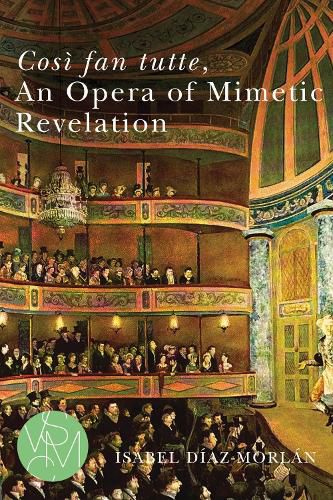Readings Newsletter
Become a Readings Member to make your shopping experience even easier.
Sign in or sign up for free!
You’re not far away from qualifying for FREE standard shipping within Australia
You’ve qualified for FREE standard shipping within Australia
The cart is loading…






Isabel Diaz-Morlan reads the characters of Cosi fan tutte, an opera by Mozart and Da Ponte, through the lens of Rene Girard's theory of unconscious mimetic desire. The opera features couples who resemble those from classical literature, including Ovid's Collatinus and Lucretia, Cervantes's Anselmo and Camila, and Shakespeare's Leonatus and Imogen. The book explores the sources of the libretto, comparing them with each other and with the libretto itself to detect the themes that reveal the mechanism of mimetic desire. This offers the groundwork for the analysis of key moments of the opera, in which the combined action of words, dramatic action and, above all, music, show how Ferrando and Guglielmo as well as Fiordiligi and Dorabella fall into mimetic rivalry, an incitement to desire and hypocrisy, always within a meconnaissance that prevents them from recognizing what is happening to them until the truth is finally unmasked.
$9.00 standard shipping within Australia
FREE standard shipping within Australia for orders over $100.00
Express & International shipping calculated at checkout
Isabel Diaz-Morlan reads the characters of Cosi fan tutte, an opera by Mozart and Da Ponte, through the lens of Rene Girard's theory of unconscious mimetic desire. The opera features couples who resemble those from classical literature, including Ovid's Collatinus and Lucretia, Cervantes's Anselmo and Camila, and Shakespeare's Leonatus and Imogen. The book explores the sources of the libretto, comparing them with each other and with the libretto itself to detect the themes that reveal the mechanism of mimetic desire. This offers the groundwork for the analysis of key moments of the opera, in which the combined action of words, dramatic action and, above all, music, show how Ferrando and Guglielmo as well as Fiordiligi and Dorabella fall into mimetic rivalry, an incitement to desire and hypocrisy, always within a meconnaissance that prevents them from recognizing what is happening to them until the truth is finally unmasked.